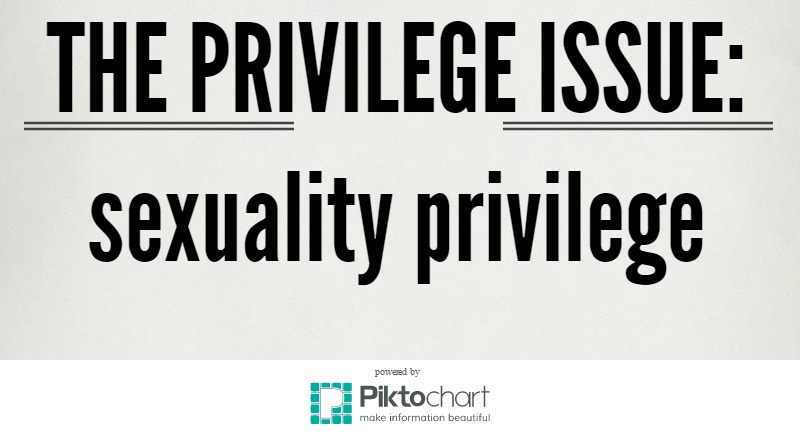R“I accept you.” A text received well after coming out. A little creepy, but still sweet.
ight now, it is a social norm to identify as heterosexual. Though sexualties vary on a spectrum and aren’t quite as black and white as heterosexual and homosexual, those that are heterosexual do have unspoken and unrealized advantages. They do not have to break society’s norm of heterosexuality and come out to their parents and friends. They do not have to experience constant discrimination. They do not have laws that prohibit their marriage.
“Heterosexual privilege definitely exists,” senior GSA officer Sophia Alejandre said. “There is no argument over whether straight couples can marry, have access to joint tax returns, are able to be with their partner in hospitals, or even have to worry about societal acceptance.”
This being said, the LGBTQ community has different struggles that many do not realize. However, senior Jeremy Wang feels privileged in such an accepting community. Wang came out to his family in his freshman year at MVHS and over time, his friends too realized that he was homosexual. He feels extremely fortunate that he has not lost a friend as a result of his sexuality.
“[Understanding that I was not heterosexual] took some figuring out,” Wang said. “But now, I have no shame.”
But, at first, Wang was not as accepting of himself. Suppressing his one secret led to him ultimately suppressing his life. When he was in the closet, he felt the tremendous burden to need to hide everything about him in order to be as average as he could be. At first, coming out was an obvious pain. Wang’s only support groups were initially from the internet. Seeing openly homosexual YouTubers and resources for members of the LGBTQ group really inspired him. However, he cautions people that glimpse through resources for help. Since it’s the internet, many assertive voices that are prevalent on websites speak with spiteful comments like: “Why is there gay pride?” because they are simply unaware of what it’s like to not be heterosexual. At first, Wang was highly sensitive to bigotry jokes about members of the LGBTQ community and felt bad anytime someone said one around him. For the early stages, sensitivity was crucial.
For him, his support group has always been his friends. But, since he realizes that not everyone is as blessed as him to have such supportive friends, he chooses to live his own life so others will understand that being openly homosexual is normal. Wang knows many people in hiding and just wants people to understand that they are not alone in what they feel. He is there for anyone to talk to, and when he helps people, it helps him too.
“Live your life in a way that people can look up to you,” Wang said. “I hope people that look up to me understand that they’re not alone.”
Wang feels lucky to just be able to live and be openly homosexual at the same time since many in other parts of the world are murdered simply if they are suspected of being homosexual. He feels the need to be part of social activism later in his life to raise awareness of the unfair treatments of members of the LGBTQ community. He believes that the world is progressing to provide more equality for all.
GSA Vice President Senior Soham Chowdhury agrees with Wang’s sentiments. “No, homosexual privilege does not exist. For example, as a non-heterosexual, you have to announce your sexuality because it’s not seen as the default,” Chowdhury said.
Interestingly, in a survey of 170 students from MVHS, 29 percent believe that homosexual privilege does exist. To Chowdury, this perceived notion that people have regarding homosexual privilege is ridiculous. Privilege, as defined by Chowdhury, means that society is structured in a way that favors a certain group of people.
“There is less discrimination at MVHS because it’s just casual ignorance here,” Chowdhury said. People aren’t actively being offensive, but it’s just the little things people say. When people say things like ‘That’s so gay,’ or ‘fag’ as a substitution for other negative words it is quite derogatory.”








